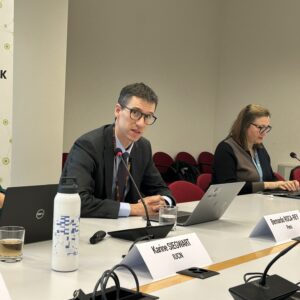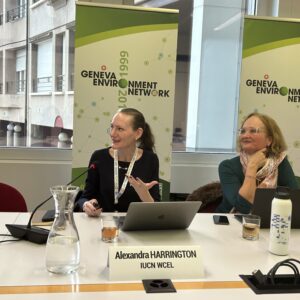Event Conference
Biodiversity and the Global Plastics Treaty: IUCN’s Proposal for a Specific Article on “Biodiversity Aspects” in the Future Treaty
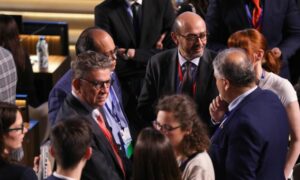
26 Mar 2024
13:00–14:30
Venue: International Environment House I, Room 3 & Online | Webex
Organization: International Union for Conservation of Nature, Geneva Environment Network
This event, taking place ahead of the fourth session of the Intergovernmental Negotiating Committee to develop an international legally binding instrument on plastic pollution, presented a legal brief developed by IUCN on the need to include a specific article on biodiversity in the future plastics treaty (ILBI). This session, organized in the framework of the Geneva Beat Plastic Pollution Dialogues provided a platform for stakeholders to discuss the importance of addressing biodiversity aspects in the treaty itself.
About this Event
Biodiversity has come to play a prominent role in international law, including in multilateral environmental agreements as well as in other areas such as trade. A focus on the connections between plastic pollution, biodiversity loss, and the degradation of ecosystems at the global, regional and national levels is important when directing efforts toward effective solutions to the triple planetary crisis.
IUCN and the IUCN World Commission on Environmental Law propose for the Revised Zero Draft and the final text of the ILBI the inclusion of explicit references to the connections between plastic pollution, circular economy solutions, and biodiversity and ecosystems protections. While these references are commonly found in preambular text of treaty instruments, IUCN asserts that the protection and restoration of biodiversity, and nature per se, must be incorporated in the legally binding control measures and enforcement terms of the ILBI. The ILBI must align with the concept of nature positive measures that have been established as benchmarks.
In this event, distinguished speakers reflected on this important topic – and how it can be advanced in the upcoming fourth round of negotiations for the ILBI.
Geneva Beat Plastic Pollution Dialogues

The world is facing a plastic crisis, the status quo is not an option. Plastic pollution is a serious issue of global concern which requires an urgent and international response involving all relevant actors at different levels. Many initiatives, projects and governance responses and options have been developed to tackle this major environmental problem, but we are still unable to cope with the amount of plastic we generate. In addition, there is a lack of coordination which can better lead to a more effective and efficient response.
Various actors in Geneva are engaged in rethinking the way we manufacture, use, trade and manage plastics. The Geneva Beat Plastic Pollution Dialogues aim at outreaching and creating synergies among these actors, highlighting efforts made by intergovernmental organizations, governments, businesses, the scientific community, civil society and individuals in the hope of informing and creating synergies and coordinated actions. The dialogues highlight what the different stakeholders in Geneva and beyond have achieved at all levels, and present the latest research and governance options.
Following the landmark resolution adopted at UNEA-5 to end plastic pollution and building on the outcomes of the first two series, the third series of dialogues will encourage increased engagement of the Geneva community with future negotiations on the matter.
Speakers
By order of intervention.
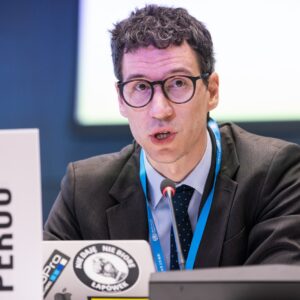
Bernardo ROCA-REY
Minister-Counsellor, Permanent Mission of Peru to the United Nations and other international organizations in Geneva
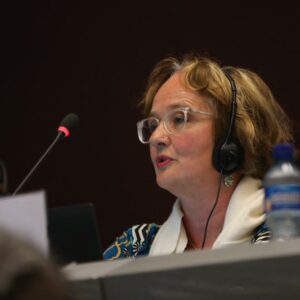
Karine SIEGWART
Senior Policy Advisor, IUCN

Alexandra HARRINGTON
Chair, Plastic Pollution Task Force, IUCN WCEL
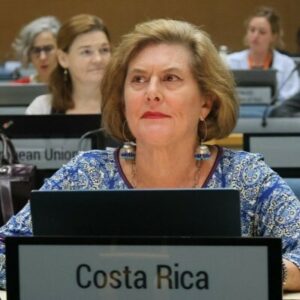
H.E. Amb. Giovanna VALVERDE STARK
Permanent Representative of Costa Rica to UN agencies, UNEP and UN Habitat in Kenya

Benchamaporn WATTANATONGCHAI
Environmentalist, Senior Professional Level, Biodiversity Management Division, Office of Natural Resources and Environmental Policy and Planning (ONEP), Thailand (video message)

Niklaus WAGNER
Senior Policy Advisor, International Affairs Division, Federal Office for the Environment, Switzerland

Catherine WELLER
Director, Global Policy, Fauna & Flora

Catrin NORRIS
Programme Officer, Marine Plastics, Fauna & Flora
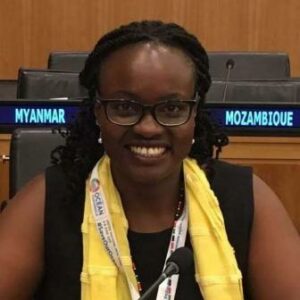
Tallash KANTAI
Digital Editor/Writer, IISD Earth Negotiations Bulletin

Musonda MUMBA
Secretary General, Ramsar Convention on Wetlands
Highlights
Summary
IUCN and the IUCN World Commission on Environmental Law proposed the inclusion of explicit references to the connections between plastic pollution, circular economy solutions, and biodiversity and ecosystems protections for the Revised Zero Draft and the final text of the International Legally Binding Instrument (ILBI). While these references are found in preambular text of some treaty instruments, IUCN asserted that the protection and restoration of biodiversity, and nature per se, must be incorporated in the legally binding control measures and enforcement terms of the ILBI. The ILBI must align with the concept of nature positive measures that have been established as benchmarks.
IUCN and IUCN WCEL assert that the inclusion of a dedicated article on biodiversity in the ILBI would:
- Facilitate the coordination of obligations under existing MEAs.
- Ensure that the legal and scientific connections between plastic pollution, circular economy, and innovations across all phases of the plastic lifecycle and the protection of biodiversity, as well as the requirements under the GBF, are rooted in international law and in the national laws that implement the respective commitments.
- Advance the interlinkages between plastic pollution and biodiversity in the context of international trade law.
Dr Karine Siegwart, IUCN Senior Policy Advisor, and Dr Alexandra Harrington, IUCN WCEL Chair of the Plastic Pollution Task Force, chaired the event and shared the detailed draft text and reasons for an Article 8ter to be added to the Revised Zero Draft text. Dr Siegwart emphasized the need to focus on people and nature and that biodiversity needs to be prominent in national legislative frameworks and global agreements if we wish to make progress. The mandate of IUCN on plastics pollution is based in two Resolutions, to focus on removing plastic pollution from the environment and to protect biodiversity and all ecosystems. Dr Harrington covered the legal reasoning and text of the proposed article in detail, noting that clearly articulated biodiversity text will serve countries and humanity better when linked to other MEAs and the SDGs.
The event’s speakers included opening remarks from Bernardo ROCA-REY, Minister-Counsellor, Permanent Mission of Peru to the United Nations and other international organizations in Geneva, who noted that the treaty needs to address legacy plastics in the ocean, which is the most visible impact on biodiversity. H.E. Amb. Giovanna VALVERDE STARK, Permanent Representative of Costa Rica to UN agencies, UNEP and UN Habitat in Kenya stated that Costa Rica believes that there will be a strong connection between the Plastics Treaty and the Kunming-Montreal Global Biodiversity Framework (GBF), but it is a complex problem that must include multiple stakeholders to solve.
In a video statement shared by Benchamaporn WATTANATONGCHAI, Environmentalist, Senior Professional Level, Biodiversity Management Division, Office of Natural Resources and Environmental Policy and Planning (ONEP), Thailand, as a CBD focal point, she noted that Target 7 of the GBF encouraged members to reduce pollution risks and the negative impact of pollution not just on animals (especially marine life), but also on ecosystems and to the livelihoods of people in Thailand and beyond. Key points made by Niklaus WAGNER, Senior Policy Advisor, International Affairs Division, Federal Office for the Environment, Switzerland, included an important point that pollution is one of the five direct drivers of biodiversity loss. He highlighted that in addition to the goals and targets of the GBF, parties at CBD COP15 have also adopted indicators to measure progress towards the GBF goals and targets, including indicators to measure progress towards GBF Target 7, including a specific indicator on plastic pollution. Further, he noted the importance of cooperation among MEAs or multilateral environmental agreements for effective implementation and action, referring to the Bern III Conference on Cooperation among the Biodiversity-related Conventions for the implementation of the Kunming-Montreal GBF.
Catherine WELLER, Director, Global Policy, Fauna & Flora and Catrin NORRIS, Programme Officer, Marine Plastics, Fauna & Flora both intervened with points that biodiversity should be included in the global plastics treaty to have greater attention paid to the effects of plastics pollution on biodiversity and should not be an afterthought. They called for an expert, technical science-led advisory body for the ILBI, which would be free from conflict of interest, because it is important to safeguard against false solutions that will have negative biodiversity impacts. It was emphasised that there is no future for humanity without biodiversity, and that biodiversity loss affects us all, but it is the people who are most reliant on healthy ecosystems and thriving biodiversity are often marginalized remote communities that are disproportionately impacted by the effects of plastic pollution, their voices need to be heard. This links to the just transition issues of the Treaty.
Tallash KANTAI, Digital Editor/Writer, IISD Earth Negotiations Bulletin shared hopes for higher ambitions at INC-4 to leverage the entry points in the Revised Zero Draft text to include more specific language on biodiversity and noted the need to ensure that plastic pollution remediation and mitigation efforts do not have a negative impact on biodiversity, but rather should be clear in meaning and in how will States be accountable for making sure that this happens.
Finally, Dr Musonda MUMBA, Secretary General, Ramsar Convention on Wetlands, made closing remarks and reiterated that rivers are transporting plastics. She highlighted the evidence of plastic pollution through river systems globally and stressed that is not an isolated issue of one country or another. To really undertake this work of global agreements and national legislation changing policy, a change in conversation at the local levels must manifest into action. She noted that this addition to the proposed treaty text will help pave the way for a cleaner environment free from plastic pollution.
Video
Live on Webex
Live at the International Environment House
Documents
- A global plastics treaty and biodiversity: converging or conflicting regimes? | IUCN and IUCN World Commission on Environmental Law | 26 March 2024
- Presentations made during the event
Links
- A future plastics treaty needs a specific article on biodiversity: IUCN’s proposal | IUCN
- Plastic and other pollution | IUCN
- UNEA-6 Outcomes
- Fourth session of the Intergovernmental Negotiating Committee on Plastic Pollution
- Plastics and Biodiversity | Plastics and the Environment Series | GEN
- Towards Plastics Pollution INC-4 | GEN
- Geneva Beat Plastic Pollution Dialogues
Photo Gallery
Photo Credits
Photo by IISD/ENB | Kiara Worth


